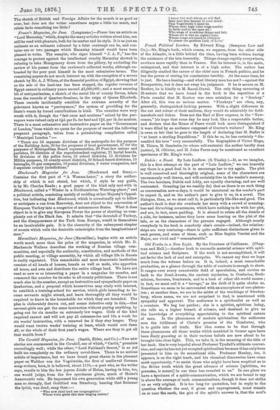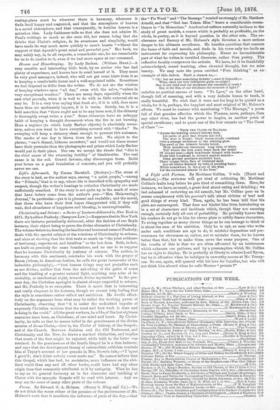Old Truths in a New Light. By the Countess of
Caithness. (Chap- man and Hall.)—Another book to reconcile material science with spiri- tual science and Scripture. If the work is not accomplished, it will not be for the lack of zeal and enterprise. We cannot say that we hope much from the volume before us. It is, indeed, a most remarkable production, as a glance through the table of contents is enough to show. It ranges over every conceivable field of speculation, and carries us back to the Zend-Avesta, the ancient mysteries, to Confucius, Brah- minism, Socrates, Semiramis, and to a host of other old-world names ; in fact, we must call it a "farrago," as the drift of it quite eludes us. Sometimes we seem to be surrounded with an atmosphere of neo-platon- ism ; at another time, we are in the midst of the teachings of Sweden- borg, whose name, we are not surprised to find, is mentioned with sympathy and approval. The authoress is a spiritualist as well as a countess. We beg her pardon ; she is a spiritist, spiritism being, she tells us, a higher branch of science, and destined to give us the knowledge of everything appertaining to the spiritual nature of man. In the phenomena of modern spiritualism the authoress sees the fulfilment of Christ's promise of the Comforter, who is to guide into all truth. Her idea seems to be that through these phenomena all those truths which mankind in former ages have been dimly guessing at in their various beliefs are now about to be brought into clear light. This, we take it, is the meaning of the title of her book. She is very hopeful about Professor Tyndall's ultimate conver- sion ,and says he has not yet accepted spiritualism because it has only been presented to him on its sensational side. Professor Huxley, too, it appears, is on the right track, and his chemical discoveries have come most opportunely, "to assist those who might have been sceptical as to the divine truth which the great advance of science [spiritism, we presume, is meant] in our time has revealed to us." In one place we have a specimen of a spirit-communication, which we are bound to say is above the average of such communications, though it does not strike us as very original. It is too long for quotation, but in reply to the question whether the soul, if gross and nnprogressed, must remain on or near the earth, the gist of the spirit's answer is, that the soul's
resting-place must be wherever there is harmony, wherever it finds itself happy and con:Anted, and that the atmosphere of heaven is a moral atmosphere, and that consequently, to localise heaven is a mistaken idea. Lady Caithness tells us that she does not admire St. Paul's writings so much as she once did, her reason being that she thinks that Christ's religion, in its sweetness and simplicity, would have made its way much more quickly to men's hearts "without the support of that Apostle's great mind and powerful pen." Her book, we may safely say, is, in all respects, a remarkable ono, far too remarkable for us to do justice to it, even if we had more space at our command.































 Previous page
Previous page